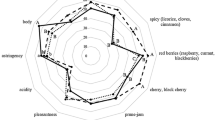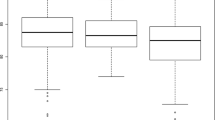Abstract
Wine is one of the most traditional consumed alcoholic beverages in the world. Millions of wine enthusiasts worldwide duly appreciate a wine of excellent quality in terms of physicochemical and sensorial properties. Different classes of wines have different volatile compositions and sensorial properties, which can be altered, depending on the vinification process and use of additives. Among the widely employed additives in wine production is sulfite (SO2). The popularity of sulfite lies in its ability to preserve the flavor and freshness of wine; however, depending on the quantity, sulfite can pose serious health risks to consumers and affect the quality of the drink. The present study evaluated and compared the compositions of volatile compounds and sensorial properties of sparkling and traditional wines (with and without SO2) produced from Greek grapes ‘Grechetto’, ‘Greco bianco’ and ‘Greco di tufo’. The results obtained of the composition of volatile compounds in these wines pointed to differences between SO2–containing, SO2-free and sparkling wines, with different amounts of compounds such as alcohols, esters, fatty acids, phenols and differences in sensorial properties. The ‘Grechetto’ wine, prepared without SO2, exhibited greater quality, better volatile composition, and better sensorial properties compared to the wines produced with SO2.

Similar content being viewed by others
References
Barril C, Clark AC, Scollary GR (2012) Chemistry of ascorbic acid and sulfur dioxide as an antioxidant system relevant to white wine. Anal Chim Acta 732:186–193. https://doi.org/10.1016/j.aca.2011.11.011
Boroski M, Crupi P, Tamborra P, Antonacci D, Toci AT (2017) Influence of winemaking techniques with low sulphur dioxide on wine varieties Chardonnay, Pinot and Montepulciano. J Food and Nutr Res 56:326–334
Bosch-Fusté J, Riu-Aumatell M, Guadayol JM, Caixach J, López-Tamames E, Buxaderas S (2007) Volatile profiles of sparkling wines obtained by three extraction methods and gas chromatography–mass spectrometry (GC–MS) analysis. Food Chem 105:428–435. https://doi.org/10.1016/j.foodchem.2006.12.053
Caruso M, Galgano F, Morelli MAC, Viggiani L, Lencioni L, Giussani B, Favati F (2012) Chemical profile of white wines produced from ‘Greco bianco’ grape variety in different italian areas by nuclear magnetic resonance (NMR) and conventional physicochemical analyses. J Agric Food Chem 60:7–15. https://doi.org/10.1021/jf204289u
Cerreti M, Ferranti P, Benucci I, Liburdi K, De Simone C, Esti M (2017) Thiol precursors in Grechetto grape juice and aromatic expression in wine. Eur Food Res Technol 243:753–760. https://doi.org/10.1007/s00217-016-2789-7
Coletta A, Trani A, Faccia M, Punzi R, Dipalmo T, Crupi P, Antonacci D, Gambacorta G (2013) Influence of viticultural practices and winemaking technologies on phenolic composition and sensory characteristics of Negroamaro red wines. Int J Food Sci Technol 48:2215–2227. https://doi.org/10.1111/ijfs.12207
Di Lena B, Acutis M (2002) Confronto tra stime della evapotraspirazione di riferimento ai fini dell’assistenza all’irrigazione in Abruzzo. Atti Convegno AIAM 6:162–164
Dutcosky SD (2013) Analise sensorial de alimentos, 4th edn. Pucpress, Curitiba
Esti M, Airola RLG, Moneta E, Paperaio M, Sinesio F (2010) Qualitative data analysis for an exploratory sensory study of grechetto wine. Anal Chim Acta 660:63–67. https://doi.org/10.1016/j.aca.2009.10.014
European Parliament and of The Council (2011) Regulation (EU) No 1169/2011 of The European Parliament and of The Council of 25 October 2011 on the provision of food information to consumers. Official Journal of the European Union, L 304, 2011, pp 18–63. https://eurlex.europa.eu/LexUriServ/LexUriServ.do?uri=OJ:L:2011:304:0018:0063:en:PDF Accessed 9 February 2020
Gao YC, Zhang G, Krentz S, Darius S, Power J, Lagarde G (2002) Inhibition of spoilage lactic acid bacteria by lysozyme during wine alcoholic fermentation. Aust J Grape Wine Res 8:76–83. https://doi.org/10.1111/j.1755-0238.2002.tb00214.x
Gmel G, Labhart F, Rehm J, Rylett M, Shield K (2014) Alcohol consumption. In: World Health Organization (ed) Global status report on alcohol and health. WHO Press, Luxembourg, pp 27–42
Harbertson JF, Parpinello GP, Heymann H, Downey MO (2012) Impact of exogenous tannin additions on winechemistry and wine sensory character. Food Chem 131:999–1008. https://doi.org/10.1016/j.foodchem.2011.09.101
Lambrechts MG, Pretorius IS (2000) Yeast and its importance to wine aroma - a review. S Afr J Enol Vitic 21:97–129. https://doi.org/10.21548/21-1-3560
Li H, Tao YS, Wang H, Zhang L (2008) Impact odorants of Chardonnay dry white wine from Changli County (China). Eur Food Res Technol 227:287–292. https://doi.org/10.1007/s00217-007-0722-9
Li H, Wang H, Yuan C, Wang S (2005) Wine chemistry. Scientific Publishing Company, Beijing
Li X, Lim SL, Yu B, Curran P, Liu SQ (2013) Mango wine aroma enhancement by pulp contact and β-glucosidase. Int J Food Sci Technol 48:2258–2266. https://doi.org/10.1111/ijfs.12212
Li Z, Pan Q, Jin Z, Mu L, Duan C (2011) Comparison on phenolic compounds in Vitis vinifera cv. Cabernet Sauvignon wines from five wine-growing regions in China. Food Chem 125:77–83. https://doi.org/10.1016/j.foodchem.2010.08.039
Linskens HF, Jackson JF (1988) Wine analysis, 1st edn. Springer, Berlin
Ribéreau-Gayon P, Glories Y, Maujean A, Dubourdieu D (2006) Phenolic compounds. In: Ribéreau-Gayon P, Glories Y, Maujean A, Dubourdieu D (eds) Handbook of enology, volume 2: The chemistry of wine stabilization and treatments, 2nd edn. Wiley –Blackwell, Chichester, pp 141–203
Ruiz J, Kiene F, Belda I, Fracassetti D, Marquina D, Navascués E, Calderón F, Benito A, Rauhut D, Santos A, Benito S (2019) Effects on varietal aromas during wine making: a review of the impact of varietal aromas on the flavor of wine. Appl Microbiol Biotechnol 103:425–7450. https://doi.org/10.1007/s00253-019-10008-9
Singleton VL, Noble AC (1976) Wine flavor and phenolic substances. In: Charalambous E, Katz I (eds) Phenolic, sulfur and nitrogen compounds in food flavors. American Chemical Society, Washington DC, pp 47–70
Sonni F, Chinnici F, Natali N, Riponi C (2011) Pre-fermentative replacement of sulphur dioxide by lysozyme and oenological tannins: effect on the formation and evolution of volatile compounds during the bottle storage. Food Chem 129:1193–1200
Souza JC, Pezza HR, Pezza L (2016a) A simple and green analytical method for determination of copper(II) in whisky and sugarcane spirit by diffuse reflectance spectroscopy. Anal Methods 8:1867–1875. https://doi.org/10.1039/C5AY03073K
Souza JC, Silva JL, Fabrão RM, Stradiotto NR, Zanoni MVB (2019) Electroactive sugars, organic acids and sugar alcohol analysis in wine using anon-exchange chromatography with electrochemical detection. Microchem J 147:972–978. https://doi.org/10.1016/j.microc.2019.04.010
Souza JC, Toci AT, Beluomini MA, Eiras SP (2016b) Spectrophotometric determination of copper(II) in sugarcane spirit using 1-(2-pyridylazo)-2-naphthol and a homogeneous ternary mixture of the solvents water, ethanol and methyl isobutyl ketone. Rev Virtual Quim 8:687–701. https://doi.org/10.5935/1984-6835.20160052
Souza JC, Toci AT, Beluomini MA, Eiras SP (2017) Determination of copper in sugarcane spirit by flame atomic absorption spectrometry using a ternary solvent mixture (water-ethanol-acetone). Eclet Quim J 42:33–39. https://doi.org/10.26850/1678-4618eqj.v42.1.2017.p33-39
Toci AT, Crupi P, Gambacorta G, Dipalmo T, Antonacci D, Coletta A (2012) Free and bound aroma compounds characterization by GC-MS of Negroamaro wine as affected by soil management. J Mass Spectrom 47:1104–1112. https://doi.org/10.1002/jms.3045
Vally H, Thompson PJ (2001) Role of sulfite additivies in wine induced asthma: single dose and cumulative dose studies. Thorax 56:763–769. https://doi.org/10.1136/thorax.56.10.763
Vally H, Thompson PJ (2003) Allergic and asthmatic reactions to alcoholic drinks. Addict Biol 8:3–11. https://doi.org/10.1080/1355621031000069828
Zhang J, Li J, Wang J, Sun B, Liu Y, Huang M (2020) Characterization of aroma-active compounds in Jasminum sambac concrete by aroma extract dilution analysis and odour activity value. Flavour Fragr J. https://doi.org/10.1002/ffj.3631
Acknowledgements
The authors do sincerely acknowledge their indebtedness and gratitude to the Agricultural Research Council-Research Unit for Viticulture and Enology in Southern Italy (CREA, Turi—Italy) for the provision of resources and for the financial assistance granted in support of this work. We also thank the collaborators Sabino Roccotelli and Mazzone Francesco. The authors would also like to thank the Institutional Program for the Support of Research Groups of UNILA (PRPPG N° 80, July 19, 2019).
Funding
Not applicable.
Author information
Authors and Affiliations
Contributions
João Carlos de Souza: Data curation, writing original draft and editing. Pasquale Crupi: Data curation, writing original draft. Antonio Colletta: Data curation, writing original draft. Donato Antonacci: Funding acquisition. Aline Theodoro Toci: Conceptualization, funding aquisition, methodology, data curation, writing—original draft, review and editing.
Corresponding author
Ethics declarations
Conflicts of interest
The authors declare that they have no conflicts of interests.
Additional information
Publisher's Note
Springer Nature remains neutral with regard to jurisdictional claims in published maps and institutional affiliations.
Supplementary Information
Below is the link to the electronic supplementary material.
Rights and permissions
About this article
Cite this article
de Souza, J.C., Crupi, P., Colletta, A. et al. Influence of vinification process over the composition of volatile compounds and sensorial characteristics of greek wines. J Food Sci Technol 59, 1499–1509 (2022). https://doi.org/10.1007/s13197-021-05160-y
Revised:
Accepted:
Published:
Issue Date:
DOI: https://doi.org/10.1007/s13197-021-05160-y




